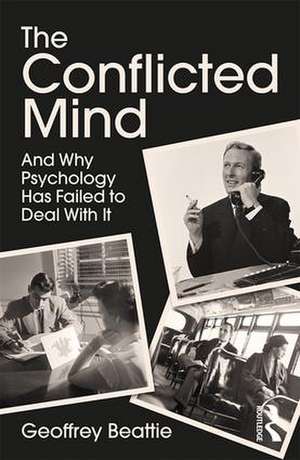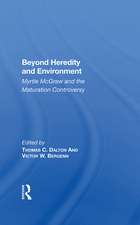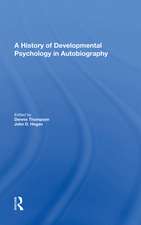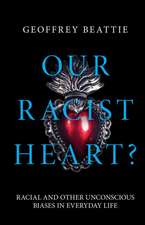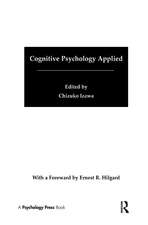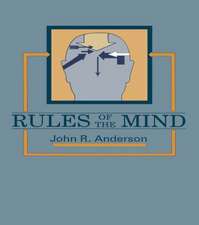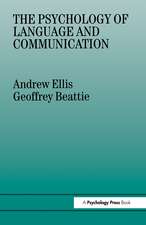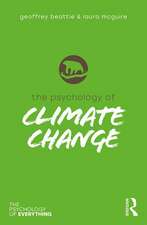The Conflicted Mind: And Why Psychology Has Failed to Deal With It
Autor Geoffrey Beattieen Limba Engleză Paperback – 30 oct 2017
However, the ‘conflicted mind’ is a broader concept than just the clash between potential (hypothetical) systems of thinking, because in one form or another it forms the very pillars on which the edifice of social psychology is built. This unique book therefore examines key social psychology theories and research in a new light, including Festinger’s concept of cognitive dissonance, Milgram’s obedience experiments, Bateson’s description of conflict in communications, and Bartlett’s explorations of the constructive nature of human memory.
Geoffrey Beattie argues that although these classic studies were sometimes great and imaginative beginnings, they were also full of flaws, which social psychology must remedy if it is to make the kind of impact it aspires to. In doing so, he offers a ground breaking perspective on why we think and act in the way we do, to see what lessons can be learned for the discipline of social psychology going forward. Written in the author’s distinct open and engaging style, The Conflicted Mind is a fascinating resource for researchers, specialists, and students in the field, as well as the general reader.
| Toate formatele și edițiile | Preț | Express |
|---|---|---|
| Paperback (1) | 364.69 lei 6-8 săpt. | |
| Taylor & Francis – 30 oct 2017 | 364.69 lei 6-8 săpt. | |
| Hardback (1) | 764.20 lei 6-8 săpt. | |
| Taylor & Francis – 31 oct 2017 | 764.20 lei 6-8 săpt. |
Preț: 364.69 lei
Nou
Puncte Express: 547
Preț estimativ în valută:
69.80€ • 72.67$ • 58.98£
69.80€ • 72.67$ • 58.98£
Carte tipărită la comandă
Livrare economică 08-22 martie
Preluare comenzi: 021 569.72.76
Specificații
ISBN-13: 9781138665798
ISBN-10: 1138665797
Pagini: 314
Ilustrații: 20 Line drawings, black and white
Dimensiuni: 129 x 198 x 18 mm
Greutate: 0.33 kg
Ediția:1
Editura: Taylor & Francis
Colecția Routledge
Locul publicării:Oxford, United Kingdom
ISBN-10: 1138665797
Pagini: 314
Ilustrații: 20 Line drawings, black and white
Dimensiuni: 129 x 198 x 18 mm
Greutate: 0.33 kg
Ediția:1
Editura: Taylor & Francis
Colecția Routledge
Locul publicării:Oxford, United Kingdom
Public țintă
General, Professional, and UndergraduateCuprins
Chapter 1: Introduction
Chapter 2: Conflicted Attitudes
Chapter 3: Conflicted Habits
Chapter 4: Conflicted Cognitions
Chapter 5: Conflicted Talk
Chapter 6: Conflicted Memories
Chapter 7: Conflicted Roles
Chapter 8: Concluding Remarks
Chapter 2: Conflicted Attitudes
Chapter 3: Conflicted Habits
Chapter 4: Conflicted Cognitions
Chapter 5: Conflicted Talk
Chapter 6: Conflicted Memories
Chapter 7: Conflicted Roles
Chapter 8: Concluding Remarks
Notă biografică
Professor Geoffrey Beattie is Professor of Psychology at Edge Hill University and in recent years a Masters supervisor on the Sustainability Leadership Programme at the University of Cambridge and Visiting Professor at the University of California, Santa Barbara. He was Professor of Psychology at the University of Manchester from 1994-2012. He has a Ph.D. in psychology from the University of Cambridge and has been awarded both the Spearman Medal by the British Psychological Society for 'published psychological research of outstanding merit' and the internationally acclaimed Mouton d'Or for his work in semiotics.
Descriere
One of the greatest paradoxes of human behavior is our tendency to say one thing and do something completely different. We think of ourselves as positive and fair-minded, caring about other people and our environment, yet our behavior lets us down time and time again. Part of the reason for this is because we really do have two separate selves: two separate and dissociated mental systems - one conscious, reflective and rational, and one whose motives and instincts are rooted in the unconscious and whose operation resists reflection, no matter how hard we try. In all kinds of areas of our life – love, politics, race, survival - one system seems to make very different sorts of judgements to the other, and is subject to distinct, hidden biases. The Divided Self explores how and why this system operates as it does and how we can use that knowledge to promote positive behaviour change.
